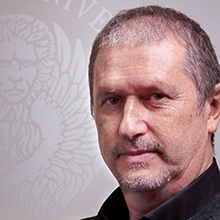Tell us about yourself: where do you come from, what do you teach at Ca' Foscari, how was your education?
At Ca' Foscari I teach Moral Philosophy and Bioethics. Ca' Foscari is also the university where I studied and where I come from. I remember enrolling here back in 1987, drawn by the work of Emanuele Severino, whom I had heard a lot about from my high school philosophy teacher and had already started reading a few volumes. Severino had led me to become fascinated by matters of metaphysical ontology, which I eventually decided to devote my dissertation to, exploring not only Severino's thought, but also that of his mentors and opponents, starting with Gustavo Bontadini's Milan school and Marino Gentile's Padua school. In this process I was guided not only by Severino himself, but also by Carmelo Vigna who, like Severino, had studied with Bontadini at the Catholic University of Milan.
After graduating in Philosophy, I attended the PhD, which at that time was a joint course between the Universities of Venice and Padua. In Padua I met some scholars I had already run into while analysing the discussions between Severino and his main interlocutors. Among the most interesting exchanges I had with Padua professors there were undoubtedly those with Franco Chiereghin (who was my tutor for my PhD dissertation, along with Carmelo Vigna), Piero Faggiotto and Enrico Berti. With the latter I also had the pleasure of engaging in a discussion on the semanticisation of being on the pages of the "Rivista di Filosofia Neo-Scolastica" (Journal of Neo-Scholastic Philosophy, 1996). The result of all this research and reflection can now be found in a short volume entitled "Polemiche di metafisica. Quattro dibattiti sull'Essere, il Nulla e il Divenire" (Controversies on Metaphysics. Four discussions on Being, Nothingness and Becoming) (Aracne, 2009).
What are your professional references?
A fundamental reference, for me, is undoubtedly the work and also the figure of French philosopher Paul Ricoeur. I got to know him during a series of trips he made to Friuli, the region where I was born and where I lived most of my life. In the 90s, a special relationship developed between Ricoeur and the Philosophical Society of Friuli Venezia Giulia. For a number of years, meeting Ricoeur in Friuli had become almost a habit. Ricoeur's stays in Friuli were always a mix of official meetings, informal moments and even entertainment. In those same years, the University of Venice had also begun to invite him on various occasions, and I was happy to act as a liaison. Between 1994 and 1995, I stayed in Paris as a 'pensionnaire scientifique' at the École Normale Supérieure in Fontenay/Saint-Cloud. This stay in Paris gave me the opportunity to meet Ricoeur more often. Our meetings took place either at his private home in Châtenay-Malabry or in the offices of the journal Ésprit, rue Saint-Martin, since Ricoeur had already retired and no longer had an office at the university. The result of these exchanges with Ricoeur is contained in a volume entitled "Verità del metodo. Indagini su Paul Ricoeur" [Truth of Method: Investigations on Paul Ricoeur] (Il Poligrafo, 2000), which contains a foreword by Ricoeur himself and an appendix with the transcription of some of our conversations.
Summarising here my intellectual debt to Ricoeur would be impossible. All I can say is that I had started to study him from some ontological questions, which were at the centre of my interests at the time and which he was also addressing at the time (his 1990 volume entitled "Soi-même comme un autre" - Seuil, Paris - ended with a chapter entitled "Towards which ontology?"). However, the greatest impact that Ricoeur's thought had on my education was that it paved the way from metaphysical ontology to morality (One of his essays from that period was entitled "De la métaphysique à la morale", Revue de métaphysique et de morale, 4, 1993). In the mid-90s, Ricoeur also engaged in an interdisciplinary discussion with judges, doctors and other professionals, which resulted in two volumes on the theme of 'right' ("Le Juste", Esprit 1995; "Le Juste 2", Esprit 2001), marking a further shift from general to applied ethics.
Tell us about your academic path.
Mine has been a mixed career, half academic and half extra-academic. In fact, when I began to explore my interest in ethics, and more specifically in applied ethics, in the wake of Ricoeur, I began to feel the need to find moments of exchange and education outside the university. While the university provided me with the theoretical tools and keys to critically analyse questions of applied ethics, these same questions had to be addressed where they originated: in hospitals, research institutes, and the advisory committees of political and administrative bodies. I needed to 'work on the spot' and engage with other scholars in a truly interdisciplinary way. This is why I have been a member of various committees and working groups: the Ethics Committee for Clinical Practice of the University Hospital of Padua, the Bioethics Committee of the Veneto Region, the Ethics Committee established at the Department of Psychology of the University of Padua, the Veneto Region Working Group on the Humanisation of Healthcare. For ten years (from 2004 to 2014) I coordinated the "Ethics and Medicine" Project at the Lanza Foundation in Padua. All these experiences led me to work a lot on ‘cases’, as the students who attend my classes know. The work I am now most passionate about consists in putting ethical theories to the test of practical cases, in order to obtain insights for a critical reflection on such theories.

